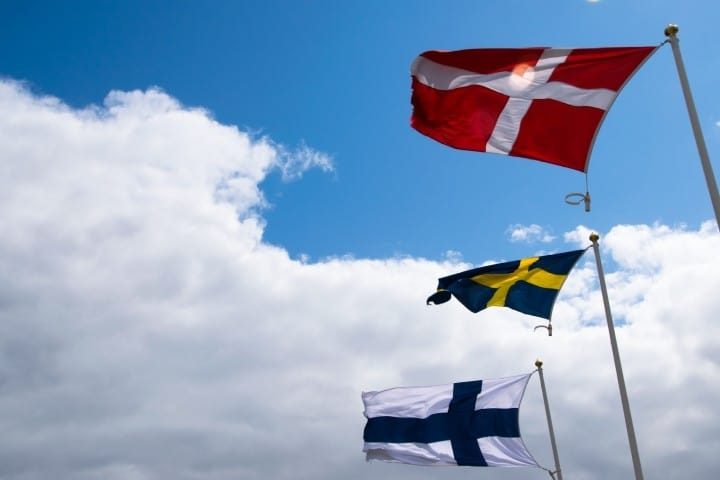
Podcast: Play in new window | Download ()
Subscribe: Android | RSS | More
This week, Denmark, Sweden, and Finland have suspended administering Moderna’s COVID “Spikevax” vaccine over an increased risk of side effects such as inflammation of the heart muscle in younger recipients.
Sweden and Denmark announced their decision on Wednesday, with Finland joining on Thursday.
According to the statement issued by the Swedish Public Health Agency, the Moderna shot will be halted for use by anyone who was born on 1991 and later for “precautionary reasons,” since
Data point to an increased incidence of myocarditis and pericarditis [two types of heart inflammation] in connection with vaccination against Covid-19, mainly in adolescents and young adults and mainly in boys and men.
At this time, those 81,000 of young Swedes who have already received a first dose of Moderna shot will not be offered a second dose at this time.
The statement continues:
New preliminary analyses from Swedish and Nordic data sources indicate that the connection is especially clear when it comes to Moderna’s vaccine Spikevax, especially after the second dose. The increase in risk is seen within four weeks after the vaccination, mainly within the first two weeks.
Under-30s who have not yet received any vaccine are now being recommended to get the Pfizer-BioNTech shot. Interestingly, however, a link to the aforementioned study provided in the statement indicates that Pfizer’s “Comirnaty” shot that uses the same mRNA technology as Moderna is also associated with an increased risk of heart inflammation in adolescents and young adults.
The decision is valid until December 1, with the agency planning to issue a new recommendation after this date.
Swedish region Gävle decided to ditch Moderna altogether.
In an interview with the local radio, Gävle vaccine coordinator Tina Mansson said, “We will not be using Moderna at all in our region,” and pointed to the “higher frequency” of heart inflammation associated with the vaccine as the reason. She added that current plans are for most people who received a first dose of Moderna not to be given any second vaccine dose, due to the assessment that a single dose already offers sufficient protection. Older people who are not in the risk group, or those who received both Moderna doses and are due for a booster shot, will be administered Pfizer instead.
In Denmark, the National Board of Health stated that Danes under the age of 18 will not be offered the Moderna vaccine. Bolette Søborg, a head of the board, indicated, a bit confusingly, that “In Denmark, we have not seen more cases of myocarditis, or that there should be any difference between the two vaccines [Pfizer and Moderna] in the Danish vaccination program.” Yet, the statement indicates that there is “a suspicion of an increased risk of heart inflammation, when vaccinated with Moderna.” Both vaccines are now being investigated, but Pfizer will be offered instead of Moderna.
Finland, similarly to Sweden, will not be offering Moderna shots to men aged 30 and younger and reportedly recommended them to opt for Pfizer’s vaccine.
Norway, the fourth Nordic country, has not officially suspended Moderna, but issued a recommendation for boys and men age 30 and younger not to take it and consider Pfizer as an alternative. Those who have received a first dose of Moderna are welcome to switch to Comirnaty.
The study cited by all of the counties will be published “within a couple of weeks,” and it has been sent to the European Medicines Agency (EMA) for assessment, according to the Finnish Institute for Health and Welfare.
A Moderna spokesperson said in an e-mail that there is nothing to worry about, and that the benefits of the protection the shot offers outweigh the risks of getting heart inflammation. “These are typically mild cases and individuals tend to recover within a short time following standard treatment and rest,” the e-mail says. It was added that the risk of myocarditis is increased for those who contract COVID, and vaccination remains “the best way to protect against this.”
In reality, however, the chances of getting heart inflammation because of the mRNA shot are far from “rare.”
The New American has previously reported that in June, the U.S. Centers for Disease Control and Prevention (CDC) held an emergency meeting about cases of heart inflammation conditions developing in younger recipients after receiving mRNA shots of Pfizer and Moderna. The CDC presentation slides revealed that chances of young male vaccine recipients (aged 12-29) developing heart inflammation is 21 times higher than in their unvaccinated peers. Girls are not spared the risk, either, and they are 5.5 times more likely to get heart problems after receiving a shot. It was argued during the meeting by one of the public speakers that the actual numbers may be three to 14 times higher than what’s been made public to date, since the CDC is withholding VAERS data and delaying publishing adverse-event reports.
Following the CDC meeting, the U.S. Food and Drug Administration (FDA) added a warning to patient and provider fact sheets for the Pfizer and Moderna COVID-19 vaccines to indicate a “rare risk” of heart inflammation.
It looks as if U.S. health officials are not as concerned about young people falling ill with heart inflammation as their Scandinavian colleagues, and continue to recommend the shot.




